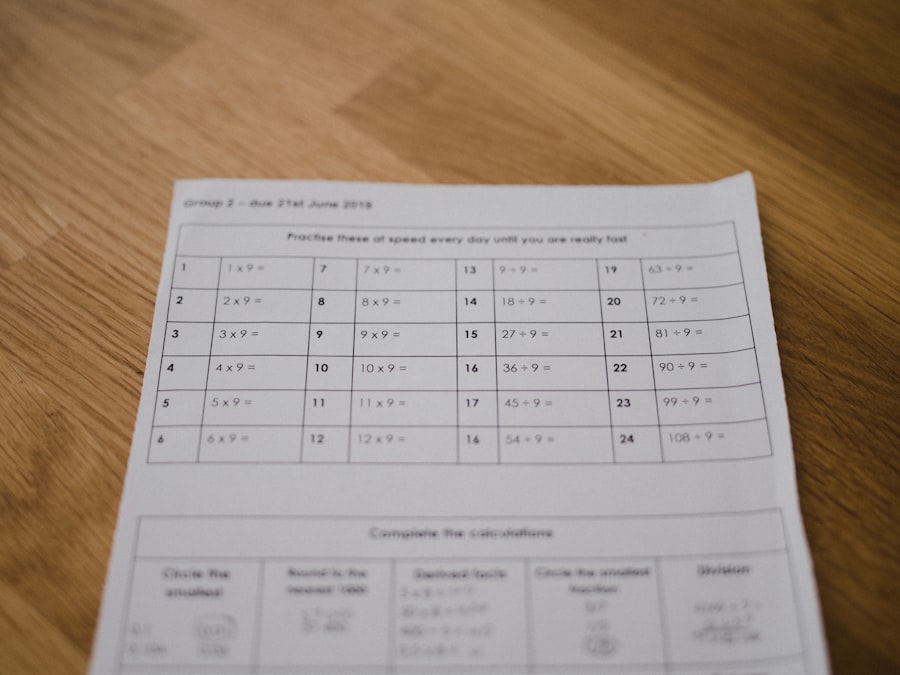As you embark on any new endeavor, whether it be learning a musical instrument, mastering a new language, or acquiring a professional skill, you will inevitably encounter a learning curve. This concept illustrates the progression of your abilities over time, highlighting the stages you will pass through as you gain knowledge and experience. The learning curve is not merely a linear path; it is a dynamic journey filled with ups and downs, moments of clarity, and instances of confusion.
Understanding this curve is crucial for setting realistic expectations and maintaining motivation throughout your learning process. The learning curve can be visualized as a series of stages that reflect your growing competence. Each stage represents a different level of awareness and skill, from complete ignorance to mastery.
By recognizing where you are on this curve, you can better navigate the challenges that arise and appreciate the progress you make along the way. This understanding will empower you to embrace the learning process, knowing that each step, no matter how small, contributes to your overall growth.
Key Takeaways
- Understanding the Learning Curve: It is a process of acquiring new skills or knowledge, and it involves several stages of development.
- The Initial Stage: Unconscious Incompetence: This is the stage where individuals are unaware of their lack of skills or knowledge in a particular area.
- The Second Stage: Conscious Incompetence: In this stage, individuals become aware of their lack of skills or knowledge and may feel a sense of frustration or inadequacy.
- The Third Stage: Conscious Competence: At this stage, individuals have developed the skills or knowledge but still need to consciously think about their actions.
- The Fourth Stage: Unconscious Competence: In this final stage, individuals have mastered the skills or knowledge to the point where they can perform them effortlessly and without conscious thought.
The Initial Stage: Unconscious Incompetence
In the initial stage of the learning curve, known as unconscious incompetence, you are blissfully unaware of what you do not know. At this point, you may feel confident in your abilities, believing that you can tackle the task at hand without any prior experience or knowledge. However, this confidence is often misplaced, as you lack the understanding necessary to recognize your limitations.
This stage can be both exciting and daunting; while you may feel a sense of freedom in your ignorance, it can also lead to frustration when faced with challenges that reveal your lack of skill. As you navigate this stage, it is essential to remain open to feedback and new information. You may find that your initial enthusiasm begins to wane as you encounter obstacles that highlight your incompetence.
This realization can be disheartening, but it is a vital part of the learning process.
Embrace this stage as an opportunity to explore and discover what you need to learn, allowing yourself to transition into the next phase of conscious incompetence.
The Second Stage: Conscious Incompetence

Once you move into the second stage of conscious incompetence, you become aware of your shortcomings. This newfound awareness can be both liberating and overwhelming. You now recognize the skills and knowledge you lack, which can lead to feelings of self-doubt and frustration.
However, this stage is crucial for your development; it is here that you begin to understand the complexities of what you are trying to learn. You may find yourself grappling with concepts that seem foreign or challenging, but this struggle is an essential part of the journey. During this stage, it is important to cultivate a growth mindset.
Embrace the idea that making mistakes is a natural part of learning. Instead of shying away from challenges, lean into them with curiosity and determination. Seek out resources, whether they be books, online courses, or mentors who can guide you through this phase.
By actively engaging with the material and practicing your skills, you will gradually build your competence and confidence, paving the way for the next stage in your learning journey.
The Third Stage: Conscious Competence
| Stage | Description |
|---|---|
| Unconscious Incompetence | Not aware of the skill or knowledge gap |
| Conscious Incompetence | Aware of the skill or knowledge gap |
| Conscious Competence | Able to perform the skill or apply the knowledge with effort and concentration |
| Unconscious Competence | Able to perform the skill or apply the knowledge effortlessly and without thinking |
As you progress to the third stage of conscious competence, you will find yourself in a position where you can perform tasks with effort and concentration. You have acquired a foundational understanding of the subject matter and can execute skills with intention. However, this stage requires mental focus; you must consciously think about each step in the process.
While this may feel like a significant achievement, it can also be exhausting as you navigate through each action with deliberation. In this stage, practice becomes paramount. The more you engage with the material and refine your skills, the more automatic your responses will become.
You may find that repetition helps solidify your understanding and builds muscle memory. It’s essential to remain patient with yourself during this phase; mastery does not happen overnight. Celebrate small victories along the way, as each successful attempt brings you closer to achieving unconscious competence—the next stage in your learning journey.
The Fourth Stage: Unconscious Competence
Upon reaching the fourth stage of unconscious competence, you will experience a sense of fluidity and ease in your abilities. At this point, your skills have become second nature; you can perform tasks without conscious thought or effort. This stage is often characterized by a feeling of mastery and confidence in your abilities.
You may find yourself able to multitask or adapt to new challenges with relative ease, as your brain has internalized the knowledge and skills required for success. However, it’s important to remember that even at this advanced stage, there is always room for growth and improvement. Mastery does not mean stagnation; rather, it opens up new avenues for exploration and deeper understanding.
You may choose to refine your skills further or branch out into related areas of interest. Embrace this stage as an opportunity to mentor others who are just beginning their journey on the learning curve. Sharing your knowledge not only reinforces your own understanding but also fosters a sense of community and collaboration.
Challenges in Navigating the Learning Curve

While the learning curve offers a structured framework for understanding your progression, it is not without its challenges. As you move through each stage, you may encounter obstacles that test your resolve and commitment to learning.
It’s common to experience moments of self-doubt or discouragement as you grapple with complex concepts or skills that seem just out of reach. Additionally, external factors such as time constraints, competing responsibilities, or lack of resources can further complicate your journey. You may find yourself questioning whether the effort is worth it or if you should abandon your pursuit altogether.
Recognizing these challenges is essential; they are part of the process and can serve as valuable learning experiences in their own right. By acknowledging these difficulties, you can better prepare yourself to face them head-on and continue moving forward on your path.
Strategies for Overcoming Obstacles
To successfully navigate the challenges that arise during your learning journey, it’s important to develop effective strategies for overcoming obstacles. One approach is to break down complex tasks into smaller, manageable steps. By focusing on one aspect at a time, you can reduce feelings of overwhelm and build confidence as you achieve each mini-goal.
This incremental approach allows for steady progress while providing opportunities for reflection and adjustment along the way. Another strategy involves seeking support from others who share similar interests or experiences. Engaging with a community—whether through online forums, study groups, or local classes—can provide encouragement and motivation during difficult times.
Sharing your struggles and successes with others fosters a sense of camaraderie and accountability that can help keep you on track. Additionally, don’t hesitate to reach out for guidance from mentors or instructors who can offer valuable insights and advice tailored to your specific needs.
The Role of Feedback in Growth
Feedback plays a pivotal role in your growth throughout the learning curve. Constructive criticism from peers or mentors can illuminate areas for improvement while also reinforcing what you are doing well. Embracing feedback requires an open mindset; rather than viewing it as a personal attack or failure, see it as an opportunity for growth and refinement.
By actively seeking out feedback and incorporating it into your practice, you can accelerate your progress and deepen your understanding. Moreover, self-reflection is another powerful tool for growth. Regularly assessing your performance allows you to identify patterns in your learning process—what strategies work best for you and where you may need additional support.
Keeping a journal or log of your experiences can help track your progress over time and provide insights into how far you’ve come on your journey.
Embracing the Process of Learning
Learning is not merely about acquiring knowledge; it is a process that encompasses exploration, experimentation, and self-discovery. Embracing this process means recognizing that mistakes are not failures but rather stepping stones toward mastery. Each misstep provides valuable lessons that contribute to your overall development.
By adopting an attitude of curiosity and resilience, you can cultivate a love for learning that transcends any specific skill or subject matter. As you navigate through each stage of the learning curve, take time to appreciate the journey itself rather than fixating solely on the end goal. Celebrate the small victories along the way—each moment of clarity or breakthrough insight adds richness to your experience.
By immersing yourself fully in the process of learning, you will find joy in discovery and growth that extends beyond any single achievement.
Recognizing the Importance of Patience
Patience is an essential virtue when it comes to navigating the learning curve. Progress may not always be linear; there will be times when it feels like you’re moving backward rather than forward. It’s crucial to remind yourself that mastery takes time and effort—there are no shortcuts on this journey.
Allow yourself grace during moments of frustration or stagnation; these feelings are normal and part of the human experience. Practicing patience also involves setting realistic expectations for yourself. Understand that everyone learns at their own pace; comparing yourself to others can lead to unnecessary stress and self-doubt.
Instead, focus on your unique path and celebrate the progress you’ve made thus far. By cultivating patience within yourself, you’ll create a more positive learning environment that fosters growth and resilience.
Celebrating Achievements and Continued Growth
As you reach milestones along your learning journey, take time to celebrate your achievements—no matter how small they may seem. Acknowledging these moments reinforces your commitment to growth and serves as motivation for future endeavors. Whether it’s treating yourself to something special or sharing your accomplishments with friends and family, celebrating success helps solidify your progress in a meaningful way.
Moreover, remember that learning is an ongoing process; there will always be new skills to acquire and knowledge to explore. Embrace this idea as an invitation for continued growth rather than a destination to reach. By maintaining a mindset focused on lifelong learning, you’ll remain open to new experiences and opportunities that enrich your life beyond measure.
In conclusion, navigating the learning curve is a multifaceted journey filled with challenges and triumphs alike. By understanding each stage—from unconscious incompetence to unconscious competence—you can better appreciate the complexities of growth while developing strategies for overcoming obstacles along the way. Embrace feedback as a tool for improvement, cultivate patience throughout the process, and celebrate every achievement as a testament to your dedication and resilience in pursuit of knowledge and skill mastery.
In exploring the concept of Learning Curve Stages, it’s essential to consider various resources that provide insights into productivity and skill acquisition. An article that complements this topic can be found on Productive Patty’s website. This resource delves into strategies for enhancing productivity, which is crucial when navigating different stages of the learning curve. For more detailed information, you can visit the article on Productive Patty. This site offers valuable tips and techniques that can help individuals effectively manage their learning processes and improve their efficiency.
FAQs
What are the different stages of the learning curve?
The learning curve consists of four stages: unconscious incompetence, conscious incompetence, conscious competence, and unconscious competence.
What is unconscious incompetence?
Unconscious incompetence is the stage where an individual is not aware of their lack of skill or knowledge in a particular area.
What is conscious incompetence?
Conscious incompetence is the stage where an individual becomes aware of their lack of skill or knowledge in a particular area.
What is conscious competence?
Conscious competence is the stage where an individual has developed the skill or knowledge in a particular area, but it requires conscious effort and concentration to perform the task.
What is unconscious competence?
Unconscious competence is the final stage where an individual has mastered the skill or knowledge to the point where it becomes second nature and can be performed without conscious effort.




